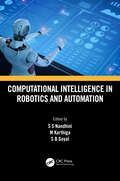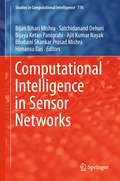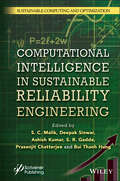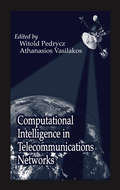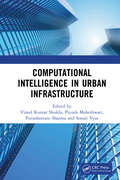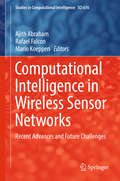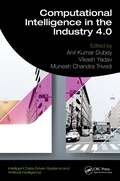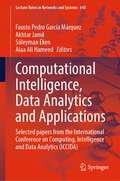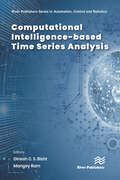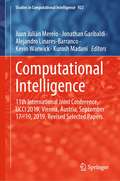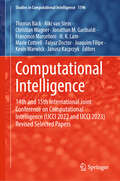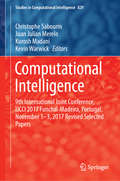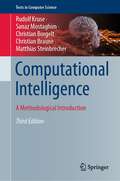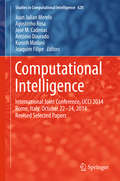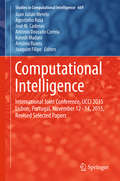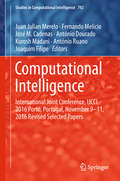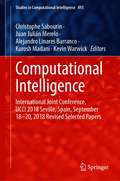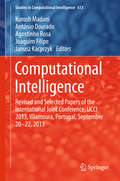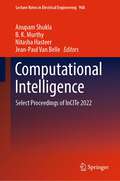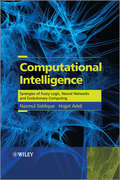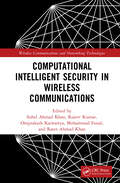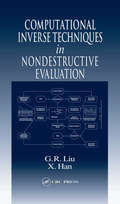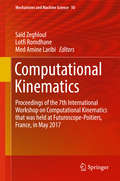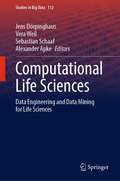- Table View
- List View
Computational Intelligence in Robotics and Automation
by S. B. Goyal S. S. Nandhini M. KarthigaThis book will help readers to understand the concepts of computational intelligence in automation industries, industrial IoT (IIOT), cognitive systems, data science, and Ecommerce real time applications. The book: Covers computational intelligence in automation industries, industrial IoT (IIOT) , cognitive systems and medical Imaging Discusses intelligent robotics applications with the integration of automation and artificial intelligence Covers foundations of the mathematical concepts applied in robotics and industry automation applications Provides application of artificial intelligence (AI) in the area of computational intelligence The text covers important topics including computational intelligence mathematical modeling, cognitive manufacturing in industry 4.0, artificial intelligence algorithms in robot development, collaborative robots and industrial IoT (IIoT), medical imaging, and multi-robot systems. The text will be useful for graduate students, professional and academic researchers in the fields of electrical engineering, electronics and communication engineering, and computer science. Discussing the advantages of the integrated platform of industry automation, robotics and computational intelligence, this text will be useful for graduate students, professional and academic researchers in the fields of electrical engineering, electronics and communication engineering, and computer science. It enlightens the foundations of the mathematical concepts applied in robotics and industry automation applications.
Computational Intelligence in Sensor Networks (Studies in Computational Intelligence #776)
by Bhabani Shankar Prasad Mishra Bijaya Ketan Panigrahi Himansu Das Bijan Bihari Mishra Satchidanand Dehuri Ajit Kumar NayakThis book discusses applications of computational intelligence in sensor networks. Consisting of twenty chapters, it addresses topics ranging from small-scale data processing to big data processing realized through sensor nodes with the help of computational approaches. Advances in sensor technology and computer networks have enabled sensor networks to evolve from small systems of large sensors to large nets of miniature sensors, from wired communications to wireless communications, and from static to dynamic network topology. In spite of these technological advances, sensor networks still face the challenges of communicating and processing large amounts of imprecise and partial data in resource-constrained environments. Further, optimal deployment of sensors in an environment is also seen as an intractable problem. On the other hand, computational intelligence techniques like neural networks, evolutionary computation, swarm intelligence, and fuzzy systems are gaining popularity in solving intractable problems in various disciplines including sensor networks. The contributions combine the best attributes of these two distinct fields, offering readers a comprehensive overview of the emerging research areas and presenting first-hand experience of a variety of computational intelligence approaches in sensor networks.
Computational Intelligence in Sustainable Reliability Engineering (Smart and Sustainable Intelligent Systems)
by Ashish Kumar Deepak Sinwar Bui Thanh Hung S. C. Malik S. R. GaddeCOMPUTATIONAL INTELLIGENCE IN SUBSTAINABLE RELIABILITY ENGINEERING The book is a comprehensive guide on how to apply computational intelligence techniques for the optimization of sustainable materials and reliability engineering. This book focuses on developing and evolving advanced computational intelligence algorithms for the analysis of data involved in reliability engineering, material design, and manufacturing to ensure sustainability. Computational Intelligence in Sustainable Reliability Engineering unveils applications of different models of evolutionary algorithms in the field of optimization and solves the problems to help the manufacturing industries. Some special features of this book include a comprehensive guide for utilizing computational models for reliability engineering, state-of-the-art swarm intelligence methods for solving manufacturing processes and developing sustainable materials, high-quality and innovative research contributions, and a guide for applying computational optimization on reliability and maintainability theory. The book also includes dedicated case studies of real-life applications related to industrial optimizations. Audience Researchers, industry professionals, and post-graduate students in reliability engineering, manufacturing, materials, and design.
Computational Intelligence in Telecommunications Networks
by Witold Pedrycz and Athanasios VasilakosTelecommunications has evolved and grown at an explosive rate in recent years and will undoubtedly continue to do so. As its functions, applications, and technology grow, it becomes increasingly complex and difficult, if not impossible, to meet the demands of a global network using conventional computing technologies. Computational intelligence (CI) is the technology of the future-and the future is now. Computational Intelligence in Telecommunications Networks offers an in-depth look at the rapid progress of CI technology and shows its importance in solving the crucial problems of future telecommunications networks. It covers a broad range of topics, from Call Admission Control, congestion control, and QoS-routing for ATM networks, to network design and management, optical, mobile, and active networks, and Intelligent Mobile Agents.Today's telecommunications professionals need a working knowledge of CI to exploit its potential to overcome emerging challenges. The CI community must become acquainted with those challenges to take advantage of the enormous opportunities the telecommunications field offers. This text meets both those needs, clearly, concisely, and with a depth certain to inspire further theoretical and practical advances.
Computational Intelligence in Urban Infrastructure
by Sonali Vyas Vinod Kumar Shukla Piyush Maheshwari Purushottam SharmaComputational Intelligence in Urban Infrastructure consolidates experiences and research results in computational intelligence and its applications in urban infrastructure. It discusses various techniques and application areas of smart urban infrastructure including topics related to smart city management. Major topics covered include smart home automation, intelligent lighting, smart human care services, intelligent transportation systems, ontologies in urban development domain, and intelligent monitoring, control, and security of critical infrastructure systems supported by case studies. Features: Covers application of AI and computational intelligence techniques in urban infrastructure planning Discusses characteristics and features of smart urban management Explores relationship between smart home and smart city management Deliberates various smart home techniques Includes different case studies for supporting and analyzing various aspects of smart urban infrastructure management. This book is aimed at researchers, graduate students, libraries in communication networks, urban and town planning, and civil engineering.
Computational Intelligence in Wireless Sensor Networks: Recent Advances and Future Challenges (Studies in Computational Intelligence #676)
by Ajith Abraham Rafael Falcon Mario KoeppenThis book emphasizes the increasingly important role that Computational Intelligence (CI) methods are playing in solving a myriad of entangled Wireless Sensor Networks (WSN) related problems. The book serves as a guide for surveying several state-of-the-art WSN scenarios in which CI approaches have been employed. The reader finds in this book how CI has contributed to solve a wide range of challenging problems, ranging from balancing the cost and accuracy of heterogeneous sensor deployments to recovering from real-time sensor failures to detecting attacks launched by malicious sensor nodes and enacting CI-based security schemes. Network managers, industry experts, academicians and practitioners alike (mostly in computer engineering, computer science or applied mathematics) benefit from th e spectrum of successful applications reported in this book. Senior undergraduate or graduate students may discover in this book some problems well suited for their own research endeavors.
Computational Intelligence in the Industry 4.0 (Intelligent Data-Driven Systems and Artificial Intelligence)
by Anil Kumar Dubey Vikash Yadav Munesh Chandra TrivediThis book discusses the importance of using industrial intelligence in collaboration with computational intelligence in forming a smart system for diverse applications. It further illustrates the challenges and deployment issues in industrial resolution. The text highlights innovation and applications of computational agents and the industrial intelligence era to automate the requirements as per Industry 4.0.This book: Discusses computational agents for handling automation issues and the role of ethics in industrial resolution Presents intelligence approaches for products, operations, systems, and services Illustrates the fundamentals of computational intelligence to forecast and analyze the requirements of society for automation as well as recent innovations and applications Highlights computation intelligence approaches in reducing human effort and automating the analysis of the production unit Showcases current innovation and applications of computational agents and industrial intelligence as per Industry 4.0 The text is primarily written for senior undergraduate and graduate students, and academic researchers in diverse fields including electrical engineering, electronics, and communication engineering, industrial engineering, manufacturing engineering and computer science, and engineering.
Computational Intelligence, Data Analytics and Applications: Selected papers from the International Conference on Computing, Intelligence and Data Analytics (ICCIDA) (Lecture Notes in Networks and Systems #643)
by Fausto Pedro García Márquez Akhtar Jamil Alaa Ali Hameed Süleyman EkenThis book is a compilation of accepted papers presented at the International Conference on Computing, Intelligence and Data Analytics (ICCIDA) in 2022 organized by Information Systems Engineering of the Kocaeli University, Turkey on September 16-17, 2022. The book highlights some of the latest research advances and cutting-edge analyses of real-world problems related to Computing, Intelligence and Data Analytics and their applications in various domains. This includes state of the art models and methods used on benchmark datasets.
Computational Intelligence-based Time Series Analysis (River Publishers Series In Automation, Control, And Robotics Is A Series Of Comprehensive Academic And Professional Books Which Focus On The Theory And Applications Of Automation, Control And Robotics. The Series Focuses On Topics Ranging From The Theory And Use Of Control Systems, Automation Engineering, Robotics And Intelligent Machines. Books Published In The Series Include Research Monographs,)
by Mangey Ram Dinesh C. S. BishtThe sequential analysis of data and information gathered from past to present is called time series analysis. Time series data are of high dimension, large size and updated continuously. A time series depends on various factors like trend, seasonality, cycle and irregular data set, and is basically a series of data points well-organized in time. Time series forecasting is a significant area of machine learning. There are various prediction problems that are time-dependent and these problems can be handled through time series analysis. Computational intelligence (CI) is a developing computing approach for the forthcoming several years. CI gives the litheness to model the problem according to given requirements. It helps to find swift solutions to the problems arising in numerous disciplines. These methods mimic human behavior. The main objective of CI is to develop intelligent machines to provide solutions to real world problems, which are not modelled or are too difficult to model mathematically. This book aims to cover the recent advances in time series and applications of CI for time series analysis.
Computational Intelligence: 11th International Joint Conference, IJCCI 2019, Vienna, Austria, September 17–19, 2019, Revised Selected Papers (Studies in Computational Intelligence #922)
by Kevin Warwick Kurosh Madani Juan Julián Merelo Jonathan Garibaldi Alejandro Linares-BarrancoThis present book includes a set of selected revised and extended versions of the best papers presented at the 11th International Joint Conference on Computational Intelligence (IJCCI 2019) – held in Vienna, Austria, from 17 to 19 September 2019. The authors focus on three outstanding fields of Computational Intelligence through the selected panel, namely Evolutionary Computation, Fuzzy Computation and Neural Computation. Besides presenting the recent advances of the selected areas, the book aims to aggregate new and innovative solutions for confirmed researchers and, on the other hand, to provide a source of information and/or inspiration for young interested researchers or learners in the ever-expanding and current filed of Computational Intelligence. It constitutes a precious provision of knowledge for individual researchers as well as represents a valuable sustenance for collective use in academic libraries (of universities and engineering schools) relating innovative techniques in various fields of applications.
Computational Intelligence: 14th and 15th International Joint Conference on Computational Intelligence (IJCCI 2022 and IJCCI 2023) Revised Selected Papers (Studies in Computational Intelligence #1196)
by Thomas Bäck Kevin Warwick Joaquim Filipe Janusz Kacprzyk Christian Wagner Marie Cottrell Jonathan M. Garibaldi Niki Van Stein Francesco Marcelloni H. K. Lam Faiyaz DoctorThe present book includes a set of selected revised and extended versions of the best papers presented at the 14th and 15th International Joint Conference on Computational Intelligence (IJCCI 2022 and IJCCI 2023) – held respectively in Valletta, Malta, between October 24–26, 2022 and Rome, Italy, between November 13–15. We focus on three outstanding fields of Computational Intelligence through the selected panel, namely: Evolutionary Computation, Fuzzy Computation and Neural Computation. Beside presenting the recent advances of the selected areas, the book aims to aggregate new and innovative solutions for confirmed researchers, and on the other hand to provide a source of information and/or inspiration for young interested researchers or learners in the ever expanding and current filed of Computational Intelligence. It could constitute a precious provision of knowledge for individual researchers as well as represent a valuable sustenance for collective use in academic libraries (ofuniversities and engineering schools) relating innovative techniques in various fields of applications.
Computational Intelligence: 9th International Joint Conference, IJCCI 2017 Funchal-Madeira, Portugal, November 1-3, 2017 Revised Selected Papers (Studies in Computational Intelligence #829)
by Kevin Warwick Juan Julian Merelo Kurosh Madani Christophe SabourinThis book presents revised and extended versions of the best papers presented at the 9th International Joint Conference on Computational Intelligence (IJCCI 2017), held in Funchal, Madeira, from 1 to 3 November 2017. It focuses on four of the main fields of computational intelligence: evolutionary computation, fuzzy computation, neural computation, and cognitive and hybrid systems. As well as presenting the recent advances of these areas, it provides new and innovative solutions for established researchers and a source of information and/or inspiration those new to the field. Discussing innovative techniques in various application areas, it is a useful resource for individual researchers and a valuable addition to academic libraries (of universities and engineering schools).
Computational Intelligence: A Methodological Introduction (Texts in Computer Science)
by Matthias Steinbrecher Rudolf Kruse Christian Borgelt Christian Braune Sanaz MostaghimThis textbook provides a clear and logical introduction to the field, covering the fundamental concepts, algorithms and practical implementations behind efforts to develop systems that exhibit intelligent behavior in complex environments. This enhanced third edition has been fully revised and expanded with new content on deep learning, scalarization methods, large-scale optimization algorithms, and collective decision-making algorithms. Features: provides supplementary material at an associated website; contains numerous classroom-tested examples and definitions throughout the text; presents useful insights into all that is necessary for the successful application of computational intelligence methods; explains the theoretical background underpinning proposed solutions to common problems; discusses in great detail the classical areas of artificial neural networks, fuzzy systems and evolutionary algorithms; reviews the latest developments in the field, covering such topics as ant colony optimization and probabilistic graphical models.
Computational Intelligence: International Joint Conference, IJCCI 2014 Rome, Italy, October 22-24, 2014 Revised Selected Papers (Studies in Computational Intelligence #620)
by Joaquim Filipe Juan Julian Merelo Agostinho Rosa José M. Cadenas António Dourado Kurosh MadaniThe present book includes a set of selected extended papers from the sixth International Joint Conference on Computational Intelligence (IJCCI 2014), held in Rome, Italy, from 22 to 24 October 2014. The conference was composed by three co-located conferences: The International Conference on Evolutionary Computation Theory and Applications (ECTA), the International Conference on Fuzzy Computation Theory and Applications (FCTA), and the International Conference on Neural Computation Theory and Applications (NCTA). Recent progresses in scientific developments and applications in these three areas are reported in this book. IJCCI received 210 submissions, from 51 countries, in all continents. After a double blind paper review performed by the Program Committee, 15% were accepted as full papers and thus selected for oral presentation. Additional papers were accepted as short papers and posters. A further selection was made after the Conference, based also on the assessment of presentation quality and audience interest, so that this book includes the extended and revised versions of the very best papers of IJCCI 2014. Commitment to high quality standards is a major concern of IJCCI that will be maintained in the next editions, considering not only the stringent paper acceptance ratios but also the quality of the program committee, keynote lectures, participation level and logistics.
Computational Intelligence: International Joint Conference, IJCCI 2015 Lisbon, Portugal, November 12-14, 2015, Revised Selected Papers (Studies in Computational Intelligence #669)
by Joaquim Filipe Agostinho Rosa José M. Cadenas Kurosh Madani Juan Julián Merelo António Dourado Correia António RuanoThis book includes a selection of revised and extended versions of the best papers from the seventh International Joint Conference on Computational Intelligence (IJCCI 2015), held in Lisbon, Portugal, from 12 to 14 November 2015, which was composed of three co-located conferences: The International Conference on Evolutionary Computation Theory and Applications (ECTA), the International Conference on Fuzzy Computation Theory and Applications (FCTA), and the International Conference on Neural Computation Theory and Applications (NCTA). The book presents recent advances in scientific developments and applications in these three areas, reflecting the IJCCI’s commitment to high quality standards.
Computational Intelligence: International Joint Conference, IJCCI 2016 Porto, Portugal, November 9–11, 2016 Revised Selected Papers (Studies in Computational Intelligence #792)
by Joaquim Filipe Juan Julian Merelo José M. Cadenas António Dourado Kurosh Madani António Ruano Fernando MelícioThis book gathers revised and extended versions of the best papers presented at the 8th International Joint Conference on Computational Intelligence (IJCCI 2016), which was held in Porto, Portugal from 9 to 11 November 2016. The papers address three main fields of Computational Intelligence, namely: Evolutionary Computation, Fuzzy Computation, and Neural Computation. In addition to highlighting recent advances in these areas, the book offers veteran researchers new and innovative solutions, while also providing a source of information and inspiration for newcomers to the field.
Computational Intelligence: International Joint Conference, IJCCI 2018 Seville, Spain, September 18–20, 2018 Revised Selected Papers (Studies in Computational Intelligence #893)
by Kevin Warwick Kurosh Madani Juan Julián Merelo Christophe Sabourin Alejandro Linares BarrancoThis present book includes a set of selected revised and extended versions of the best papers presented at the 10th International Joint Conference on Computational Intelligence (IJCCI 2018), held in Seville, Spain, from 18 to 20 September 2018, which covers four thriving fields in Computational Intelligence: Evolutionary Computation, Fuzzy Computation, Neural Computation, and Cognitive and Hybrid Systems. Besides presenting the recent advances in these areas, the book aims, on the one hand, to aggregate new and innovative solutions for confirmed researchers and, on the other hand, to provide a source of information and/or inspiration for young researchers or learners interested in the ever-increasing and current field of Computational Intelligence. This book constitutes a precious provision of knowledge for individual researchers as well as representing a valuable sustenance for collective use in academic libraries (of universities and engineering schools) relating innovative techniques in various fields of applications.
Computational Intelligence: Revised and Selected Papers of the International Joint Conference, IJCCI 2013, Vilamoura, Portugal, September 20-22, 2013 (Studies in Computational Intelligence #613)
by Joaquim Filipe Janusz Kacprzyk Agostinho Rosa António Dourado Kurosh MadaniThe present book includes a set of selected extended papers from the fifth International Joint Conference on Computational Intelligence (IJCCI 2013), held in Vilamoura, Algarve, Portugal, from 20 to 22 September 2013. The conference was composed by three co-located conferences: The International Conference on Evolutionary Computation Theory and Applications (ECTA), the International Conference on Fuzzy Computation Theory and Applications (FCTA), and the International Conference on Neural Computation Theory and Applications (NCTA). Recent progresses in scientific developments and applications in these three areas are reported in this book. IJCCI received 111 submissions, from 30 countries, in all continents. After a double blind paper review performed by the Program Committee, only 24 submissions were accepted as full papers and thus selected for oral presentation, leading to a full paper acceptance ratio of 22%. Additional papers were accepted as short papers and posters. A further selection was made after the Conference, based also on the assessment of presentation quality and audience interest, so that this book includes the extended and revised versions of the very best papers of IJCCI 2013. Commitment to high quality standards is a major concern of IJCCI that will be maintained in the next editions, considering not only the stringent paper acceptance ratios but also the quality of the program committee, keynote lectures, participation level and logistics.
Computational Intelligence: Select Proceedings of InCITe 2022 (Lecture Notes in Electrical Engineering #968)
by Anupam Shukla B. K. Murthy Nitasha Hasteer Jean-Paul Van BelleThe book constitutes the peer-reviewed proceedings of the 2nd International Conference on Information Technology (InCITe-2022): The Next Generation Technology Summit. The theme of the conference is Computational Intelligence: Automate your World. The volume is a conglomeration of research papers covering interdisciplinary research and in-depth applications of computational intelligence, deep learning, machine learning, artificial intelligence, data science, enabling technologies for IoT, blockchain, and other futuristic computational technologies. The volume covers various topics that span cutting-edge, collaborative technologies and areas of computation. The content would serve as a rich knowledge repository on information & communication technologies, neural networks, fuzzy systems, natural language processing, data mining & warehousing, big data analytics, cloud computing, security, social networks and intelligence, decision making, and modeling, information systems, and IT architectures. The book will be useful to researchers, practitioners, and policymakers working in information technology.
Computational Intelligence: Synergies of Fuzzy Logic, Neural Networks and Evolutionary Computing (Studies In Computational Intelligence Ser. #517)
by Nazmul Siddique Hojjat AdeliComputational Intelligence: Synergies of Fuzzy Logic, Neural Networks and Evolutionary Computing presents an introduction to some of the cutting edge technological paradigms under the umbrella of computational intelligence. Computational intelligence schemes are investigated with the development of a suitable framework for fuzzy logic, neural networks and evolutionary computing, neuro-fuzzy systems, evolutionary-fuzzy systems and evolutionary neural systems. Applications to linear and non-linear systems are discussed with examples. Key features: Covers all the aspects of fuzzy, neural and evolutionary approaches with worked out examples, MATLAB® exercises and applications in each chapter Presents the synergies of technologies of computational intelligence such as evolutionary fuzzy neural fuzzy and evolutionary neural systems Considers real world problems in the domain of systems modelling, control and optimization Contains a foreword written by Lotfi Zadeh Computational Intelligence: Synergies of Fuzzy Logic, Neural Networks and Evolutionary Computing is an ideal text for final year undergraduate, postgraduate and research students in electrical, control, computer, industrial and manufacturing engineering.
Computational Intelligent Security in Wireless Communications (Wireless Communications and Networking Technologies)
by Suhel Ahmad Khan, Rajeev Kumar, Omprakash Kaiwartya, Mohammad Faisal, and Raees Ahmad KhanWireless network security research is multidisciplinary in nature, including data analysis, economics, mathematics, forensics, information technology, and computer science. This text covers cutting-edge research in computational intelligence systems from diverse fields on the complex subject of wireless communication security. It discusses important topics including computational intelligence in wireless network and communications, artificial intelligence and wireless communication security, security risk scenarios in communications, security/resilience metrics and their measurements, data analytics of cyber-crimes, modeling of wireless communication security risks, advances in cyber threats and computer crimes, adaptive and learning techniques for secure estimation and control, decision support systems, fault tolerance and diagnosis, cloud forensics and information systems, and intelligent information retrieval. The book: Discusses computational algorithms for system modeling and optimization in security perspective Focuses on error prediction and fault diagnosis through intelligent information retrieval via wireless technologies Explores a group of practical research problems where security experts can help develop new data-driven methodologies Covers application on artificial intelligence and wireless communication security risk perspective The text is primarily written for senior undergraduate, graduate students, and researchers in the fields of electrical engineering, electronics and communication engineering, and computer engineering. The text comprehensively discusses wide range of wireless communication techniques with emerging computational intelligent trends, to help readers understand the role of wireless technologies in applications touching various spheres of human life with the help of hesitant fuzzy sets based computational modeling. It will be a valuable resource for senior undergraduate, graduate students, and researchers in the fields of electrical engineering, electronics and communication engineering, and computer engineering.
Computational Intelligent Techniques in Mechatronics
by Wai Lok Woo Vishal Jain Kolla Bhanu Prakash Satish Kumar Peddapelli Ivan C. K. TamThis book, set against the backdrop of huge advancements in artificial intelligence and machine learning within mechatronic systems, serves as a comprehensive guide to navigating the intricacies of mechatronics and harnessing its transformative potential. Mechatronics has been a revolutionary force in engineering and medical robotics over the past decade. It will lead to a major industrial revolution and affect research in every field of engineering. This book covers the basics of mechatronics, computational intelligence approaches, simulation and modeling concepts, architectures, nanotechnology, real-time monitoring and control, different actuators, and sensors. The book explains clearly and comprehensively the engineering design process at different stages. As the historical divisions between the various branches of engineering and computer science become less clearly defined, mechatronics may provide a roadmap for nontraditional engineering students studying within the traditional university structure. This book covers all the algorithms and techniques found in mechatronics engineering, well explained with real-time examples, especially lab experiments that will be very informative to students and scholars. Audience This resource is important for R & D departments in academia, government, and industry. It will appeal to mechanical engineers, electronics engineers, computer scientists, robotics engineers, professionals in manufacturing, automation and related industries, as well as innovators and entrepreneurs.
Computational Inverse Techniques in Nondestructive Evaluation
by G.R. Liu X. HanIll-posedness. Regularization. Stability. Uniqueness. To many engineers, the language of inverse analysis projects a mysterious and frightening image, an image made even more intimidating by the highly mathematical nature of most texts on the subject. But the truth is that given a sound experimental strategy, most inverse engineering problems can b
Computational Kinematics: Proceedings of the 7th International Workshop on Computational Kinematics that was held at Futuroscope-Poitiers, France, in May 2017 (Mechanisms and Machine Science #50)
by Saïd Zeghloul Med Amine Laribi Lotfi RomdhaneThis is the proceedings of IFToMM CK 2017, the 7th International Workshop on Computational Kinematics that was held in Futuroscope-Poitiers, France in May 2017. Topics treated include: kinematic design and synthesis, computational geometry in kinematics, motion analysis and synthesis, theory of mechanisms, mechanism design, kinematical analysis of serial and parallel robots, kinematical issues in biomechanics, molecular kinematics, kinematical motion analysis and simulation, geometric constraint solvers, deployable and tensegrity structures, robot motion planning, applications of computational kinematics, education in computational kinematics, and theoretical foundations of kinematics. Kinematics is an exciting area of computational mechanics and plays a central role in a great variety of fields and industrial applications nowadays. Apart from research in pure kinematics, the field deals with problems of practical relevance that need to be solved in an interdisciplinary manner in order for new technologies to develop. The results presented in this book should be of interest for practicing and research engineers as well as Ph. D. students from the fields of mechanical and electrical engineering, computer science, and computer graphics.
Computational Life Sciences: Data Engineering and Data Mining for Life Sciences (Studies in Big Data #112)
by Jens Dörpinghaus Vera Weil Sebastian Schaaf Alexander ApkeThis book broadly covers the given spectrum of disciplines in Computational Life Sciences, transforming it into a strong helping hand for teachers, students, practitioners and researchers. In Life Sciences, problem-solving and data analysis often depend on biological expertise combined with technical skills in order to generate, manage and efficiently analyse big data. These technical skills can easily be enhanced by good theoretical foundations, developed from well-chosen practical examples and inspiring new strategies. This is the innovative approach of Computational Life Sciences-Data Engineering and Data Mining for Life Sciences: We present basic concepts, advanced topics and emerging technologies, introduce algorithm design and programming principles, address data mining and knowledge discovery as well as applications arising from real projects. Chapters are largely independent and often flanked by illustrative examples and practical advise.
